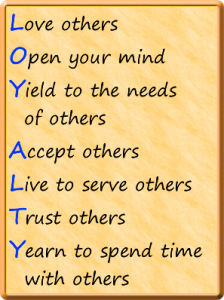The Critical Mass of Loyalty
 We all desire to be surrounded by loyalty. Knowing that the people with whom we share time and share lives have our backs. We value the quality in family, employees, and customers. Yet we spend so little time considering the catalyst that encourages this – the loyalty of leaders. Without it, encouraging loyalty in others is not sustainable. Admiral Grace Hopper once said,
We all desire to be surrounded by loyalty. Knowing that the people with whom we share time and share lives have our backs. We value the quality in family, employees, and customers. Yet we spend so little time considering the catalyst that encourages this – the loyalty of leaders. Without it, encouraging loyalty in others is not sustainable. Admiral Grace Hopper once said,
Loyalty is a two-way street – loyalty out leads to loyalty in.
Loyalty Interwoven
Some form of loyalty factors into every level of our lives:
- business or career success
- leadership
- personal relationships
- spiritual growth
Often loyalty is the missing factor that helps lead us to success in many endeavors. Without loyalty
- We cannot gather and lead effective teams and success eludes us.
- Leading or being lead becomes problematic. Loyalty is what creates the dependent bonds that allow us to follow or care enough to lead.
- All personal relationships fail because they drop to the level of simple transactional relationships instead of the caring and devoted connections that become permanent.
- We cannot devote ourselves to enlightenment and growth because we will never to open to having our heart touched or our soul fulfilled.
So critical is loyalty as a factor that the author of Think and Grow Rich and many other self-improvement tomes Napoleon Hill once said,
“Lack of loyalty is one of the major causes of failure in every walk of life.”
The Loyalty of Leaders is the Critical Key
The best way to garner loyalty is to give loyalty freely. By freely I mean that you build relationships and award loyalty without reservation once trust has entered in. And often that’s the missing factor.
Loyalty was Once a One-Way Street
Go back a few generations and one-way loyalty was the expectation. A company demanded loyalty of you but there was little loyalty in return. In fact, often your loyalty was taken advantage of.
For many years in the Japanese business culture that same level of loyalty was the standard. People would gladly sacrifice themselves for the good of the organization. Lower level executives would take the hit for the mistakes made by upper level executives.
The New Landscape of Loyalty
Over time, as younger generations watched their elders being tossed away again and again, a little cynicism developed. People were not longer willing to give unfettered loyalty and get nothing in return. You can call it selfishness if you want. Yet I believe it has more to do with our innate desire for loyalty from the people around us. Therefore, what we were once willing to set aside we cannot ignore any longer.
You want loyalty. What makes you think no one else does?
The Qualities That Demonstrate the Loyalty of Leaders
What are some qualities that demonstrate loyalty? Use the word LOYALTY to remember to practice these qualities in your life.
Love others before they deserve it or earn it. Care enough to want to add value to them.
Open your mind to the positive attributes of others. Too often, we look for reasons to not enter a relationship instead of the reasons to enter. If you are looking for a reason to be unhappy or dissatisfied, you will always find it. EVERYONE has positive qualities, the question is how do you bring them out.
Yield to the needs of the other over your own. It’s hard to be loyal to others when you are too busy putting yourself first. A loyal person always puts others first.
Accept others as they are, warts and all. Realize that YOU can’t change them. Be prepared to take them as they are or not at all; and in most cases not at all is a choice that causes you miss out on anything positive that could come from the relationship.
Live to serve others. Seek to add value in every encounter, with no expectation of receiving value in return. Relationships, whether business or otherwise, are not always transactional; it’s not always a trade. Be prepared to accept value when it is offered to you, but don’t expect it.
Trust others. This is critical. You cannot give loyalty unless you trust and you cannot receive loyalty unless you are trusted. In an interesting twist, people who don’t trust are generally not trusted. Think about it, how many people do you trust who quite clearly do not trust anyone else?
Yearn to spend time with others. In a busy world, we too often have a tendency especially with business relationships to want to go in, conduct our business, and go out. Big mistake. Take the time to build. Get personal. Ask questions beyond the sale. Build friendships, not just business partners.
Applying the Traits
When you apply these traits, you will develop loyalty to others and earn loyalty from them.
The loyalty of leaders builds mutually beneficial, symbiotic relationships that touch the heart.
With the loyalty of leaders you can add value and receive value.
You will build a team.








